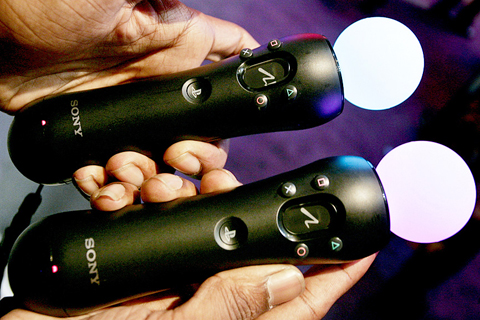The Middle East, long associated with the ubiquitous waterpipe, is intensifying an anti-smoking drive as several Arab countries ban the practice in public places, even if success looks difficult.
From Beirut to Cairo, cigarettes are smoked everywhere, not just in cafes and restaurants, but in banks, ministries and even hospitals.
Egypt, the most populous nation in the Arab world and the heaviest smoker, announced on Thursday last week its intention to make the Mediterranean city of Alexandria the country’s “first smoke-free city.” Its health ministry, though, did not say how it would achieve this goal.

PHOTO: AFP WARNING: SMOKING CAN DAMAGE YOUR HEALTH
An existing law that prohibits smoking in public places is frequently flouted — notably by civil servants and police.
Nearly 40 percent of Egyptian men smoke, the vast majority of them throughout the day, according to a report published by the WHO in January. On top of this, at least 70 percent of those questioned for the survey said they were subjected to passive smoking at home or in the workplace.
Jordan, Syria and the United Arab Emirates (UAE) are also looking to kick the habit, having all passed anti-smoking legislation in recent months.
In January, UAE President Khalifa bin Zayed al-Nahayan, ordered a ban “on smoking in public transport and closed public places.”
Within the UAE, Dubai took the lead, introducing smoking restrictions as far back as 2007.
The official WAM news agency has admitted the new law is not being implemented everywhere, but insisted that “state-owned buildings such as schools, universities, hospitals, theaters and gyms will have to conform to the total smoking ban in the very near future.”
In Syria, where nearly 60 percent of men and 23 percent of women smoke, a ban on smoking in public places came into force in April, with fines of between US$45 and US$870 and potentially up to two years in prison.
Apart from its toll on the nation’s health, Syrian authorities have good reason to reduce smoking, with the average smoker spending 8 percent of his annual salary on tobacco.
In Egypt, home of the shisha, or waterpipe, the WHO survey found that smokers spend around 6 percent of their income on tobacco.
Jordan joined the campaign last month, announcing a smoking ban which its health ministry says will be strictly applied — with inspectors carrying out surprise visits on ministries and public places.
Some Arab countries, however, appear less willing to quit.
In Lebanon, where cigarettes are cheap — at around just US$1 a pack — an anti-smoking law is still under study. While Beirut signed the WHO’s framework convention on the fight to stop smoking, the document was never ratified.
In Iraq, meanwhile, there is no anti-smoking law at all and very few public places impose smoking restrictions of any kind, with one notable exception.
Visitors to the Ibn Bittar heart hospital in Baghdad have their cigarette packs confiscated on arrival, under the orders of Iraq’s health ministry.

In his National Day Rally speech on Sunday, Singaporean Prime Minister Lawrence Wong (黃循財) quoted the Taiwanese song One Small Umbrella (一支小雨傘) to describe his nation’s situation. Wong’s use of such a song shows Singapore’s familiarity with Taiwan’s culture and is a perfect reflection of exchanges between the two nations, Representative to Singapore Tung Chen-yuan (童振源) said yesterday in a post on Facebook. Wong quoted the song, saying: “As the rain gets heavier, I will take care of you, and you,” in Mandarin, using it as a metaphor for Singaporeans coming together to face challenges. Other Singaporean politicians have also used Taiwanese songs

NORTHERN STRIKE: Taiwanese military personnel have been training ‘in strategic and tactical battle operations’ in Michigan, a former US diplomat said More than 500 Taiwanese troops participated in this year’s Northern Strike military exercise held at Lake Michigan by the US, a Pentagon-run news outlet reported yesterday. The Michigan National Guard-sponsored drill involved 7,500 military personnel from 36 nations and territories around the world, the Stars and Stripes said. This year’s edition of Northern Strike, which concluded on Sunday, simulated a war in the Indo-Pacific region in a departure from its traditional European focus, it said. The change indicated a greater shift in the US armed forces’ attention to a potential conflict in Asia, it added. Citing a briefing by a Michigan National Guard senior

CHIPMAKING INVESTMENT: J.W. Kuo told legislators that Department of Investment Review approval would be needed were Washington to seek a TSMC board seat Minister of Economic Affairs J.W. Kuo (郭智輝) yesterday said he received information about a possible US government investment in Taiwan Semiconductor Manufacturing Co (TSMC, 台積電) and an assessment of the possible effect on the firm requires further discussion. If the US were to invest in TSMC, the plan would need to be reviewed by the Department of Investment Review, Kuo told reporters ahead of a hearing of the legislature’s Economics Committee. Kuo’s remarks came after US Secretary of Commerce Howard Lutnick on Tuesday said that the US government is looking into the federal government taking equity stakes in computer chip manufacturers that

CLAMPING DOWN: At the preliminary stage on Jan. 1 next year, only core personnel of the military, the civil service and public schools would be subject to inspections Regular checks are to be conducted from next year to clamp down on military personnel, civil servants and public-school teachers with Chinese citizenship or Chinese household registration, the Mainland Affairs Council (MAC) said yesterday. Article 9-1 of the Act Governing Relations Between the People of the Taiwan Area and the Mainland Area (臺灣地區與大陸地區人民關係條例) stipulates that Taiwanese who obtain Chinese household registration or a Chinese passport would be deprived of their Taiwanese citizenship and lose their right to work in the military, public service or public schools, it said. To identify and prevent the illegal employment of holders of Chinese ID cards or